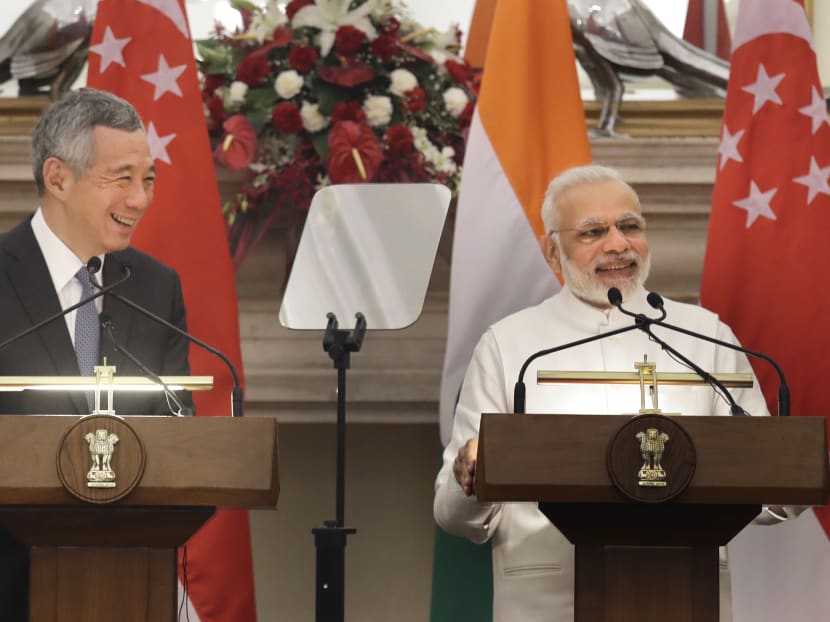Over-regulation a roadblock for firms venturing into India: PM Lee
NEW DELHI — India must move more quickly in opening up its economy to foreign investors, said Prime Minister Lee Hsien Loong, stressing how its push for economic growth “cannot be a one-way exercise” that holds back foreign companies from operating there.

Singapore's Prime Minister Lee Hsien Loong (left) and India's Prime Minister Narendra Modi (right) in New Delhi on Tuesday, Oct 4, 2016. Photo: AP
NEW DELHI — India must move more quickly in opening up its economy to foreign investors, said Prime Minister Lee Hsien Loong, stressing how its push for economic growth “cannot be a one-way exercise” that holds back foreign companies from operating there.
The country must go further in changing the rules of its business environment and “reimagining” its position in the global economy to fuel more growth, he said, noting India’s international trade flows when compared to China’s are still “not in proportion to what it could be”.
Mr Lee was speaking during an interview with Indian national daily The Hindu on Wednesday (Oct 5), a transcript of which was released to Singapore media. Mr Lee — who is on a five-day working visit to India — cited over-regulation as one bottleneck for Singapore businesses trying to venture into India.
“There are many rules and not all of them are fully consistent with one another and if you want to comply with all of them, you may find there’s no possible solution,” he said. “Singapore entities wanting to do industrial parks in India, for example, they have often taken very long to clear the issues of land acquisition and it becomes politicised. And you can’t settle it and in the end the project just languishes and nothing happens.”
On a Singapore consortium’s plans to build Andhra Pradesh’s new capital, Amaravati — which hit a legal hump recently — Mr Lee said: “We hope we get the contract and we will be able to help and show what we can do.”
A local builder had challenged the way the consortium, comprising Ascendas-Singbridge and Sembcorp Development Ltd, proposed to construct the capital. The case will next be heard on Oct 31 before the Hyderabad High Court.
In the early days, India’s approach to growth was based on self-sufficiency, said Mr Lee. “It was a way to promote national cohesion and identity, and build a nation. But it was not a very effective way to grow the economy and I think for many years your economy progressed very, how shall we put it, well, languidly,” he said.
While India’s growth rate has gone up considerably in recent years — at about 6 to 7 per cent — as it eased government control, allowed more private sector investments and encouraged entrepreneurship, the “process is not complete”, said Mr Lee.
“If you want to be all over the world, you have to be part of that world and that means other countries must also be able to operate in India and then you have that interdependence. It cannot be a one-way exercise,” he said.
Asked what role India has in South-east Asia, Mr Lee said India is not just an “observer” in the region, but one with interests such as free-trade agreements (FTAs) with Singapore and the Association of South-east Asian Nations (Asean).
The country could be even more active, especially in negotiations over the proposed Regional Comprehensive Economic Partnership, a free trade pact between Asean member states and the six countries with which Asean has existing FTAs, among them India, China, Japan and Australia. “As you promote 'Make in India', you will need exports, your trade will grow and your interest will be to free up trade, not more protected trade,” Mr Lee said.
On the political front, such as over issues such as the South China Sea disputes, India can help promote a climate for “managing disputes peacefully”, where countries work towards a solution that is in accordance to international laws, Mr Lee said.
Asked about a revision of the tax treaty between Singapore and India, Mr Lee said that as countries move towards rationalising tax benefits so that companies are taxed properly, not all countries can be treated the same way, and Singapore is a country that can “help foster India’s economic objectives”.
Singapore was one of India’s largest sources of foreign direct investments last year, while more than 8,000 Indian companies have a presence in Singapore.
Noting that Singapore’s tax treaty with India was structured to encourage investments to come through Singapore to India, Mr Lee said: “We know that India is very focused on the question of black money ... And we have been very careful in Singapore to make sure that the investments into India are legitimate ones.”
He added: “If you are specifically wanting particular companies, particular projects, particular industries to come to you, you cannot avoid having some treatment treating them more favourably than you do other companies or other sources.”









